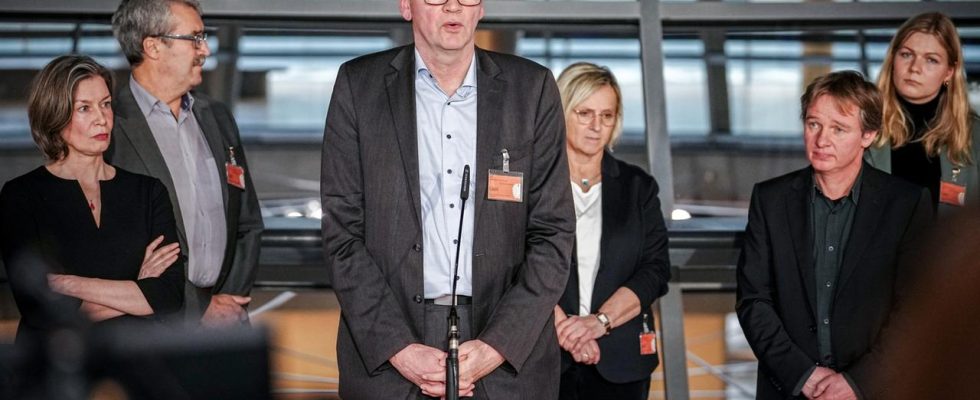analysis
After a conversation with the traffic light factions, the farmer representatives appear disillusioned. No further reversal of the cuts – but the coalition has promised relief. The dispute probably continues about what that actually means.
When Christian Lindner steps onto the stage in front of the Brandenburg Gate, an icy wind blows towards him. “Get away,” they chant in chant. In front of him, around 10,000 farmers, as well as participants from other sectors, from all over Germany vented their anger. Lindner’s speech was drowned in a sea of whistles and boos.
He also comes from the country, Lindner calls back. He knows what it’s like to clean out a horse stable. The expressions of sympathy remain unsuccessful. In the end, farmers’ president Joachim Rukwied has to step in: He should at least be listened to, “that deserves respect.”
The scene from the Brandenburg Gate could hardly be more symbolic. The mood is icy, you try to have a dialogue, but you can’t get any further. Lindner defends the cuts in diesel subsidies, saying that agriculture also has to make its contribution to the necessary savings. His offer, just like the FDP boss: reducing bureaucracy and more entrepreneurial freedom – it hardly seems to be enough for the farmers.
Politics signals concessions
At the simultaneous meeting in the Bundestag between the chairmen of the traffic light factions and representatives of associations, things were probably quieter, although the matter was similarly tough. The core issue on the agenda here too was the cuts in agricultural subsidies, especially agricultural diesel. The farmers are demanding that the traffic light coalition completely withdraw the planned gradual phase-out of the subsidy.
The parliamentary group leaders reject this, but promise relief following the talks. The SPD parliamentary group leader Rolf Mützenich, for example, announces that the coalition is planning “structural decisions” by the summer break that should give agriculture planning security. On Thursday, the coalition wants to introduce a motion for a resolution in the Bundestag for relief until the summer break.
Hardly any scope for cuts
Green party leader Britta Haßelmann also sees little scope for the planned cuts. However, she calls for a discussion about how more income could remain on the farms despite concrete challenges from climate change, competition and transformation. The wholesale market power is too great and prices are dictated.
The FDP parliamentary group leader Christian Dürr sees farmers as entrepreneurs. He calls for fair political framework conditions and the reduction of bureaucracy, because the burdens go “far beyond agricultural diesel”.
The association representatives don’t seem to have too high hopes. Bernhard Krüsken from the German Farmers’ Association, for example, complains that they have discussed many topics that have been talked about for years, but that “no solution has yet been found” to the actual core issue of agricultural diesel. Tina Andres from the Federation of Organic Food Industry accuses the traffic light of wanting to dare to have a better future, but then leaving farmers “at the altar.”
Problems known, nothing was done
The representatives and politicians seem to agree that there is no need for a new problem analysis – be it for reasons of time, as the budget is about to be passed, or simply because two commissions have already done their work in the past. Green parliamentary group leader Haßelmann points out that there is no “knowledge deficit”, but there is an “action deficit”. In other words: The problems have been known for years, but nothing has been done yet.
Politicians promise improvement. The dispute will now continue over what this should look like. Theresa Schmidt from the Association of German Rural Youth also sees “no solution in sight” when it comes to agricultural diesel and emphasizes that farmers would “not go on vacation” with the money, but rather invest it in their businesses.
Rukwied: The most expensive agricultural diesel in Europe
Farmers President Rukwied stated afterwards in a press conference that “no real step forward” had been made and increased the pressure on the traffic lights once again. They discussed topics “that we have been discussing fruitlessly for 30 years.” With the abolition of the subsidies, farmers in Germany, together with the Netherlands, would “drive the most expensive agricultural diesel in Europe”.
A result should be available by Thursday evening, i.e. at the end of the budget committee’s adjustment session in the Bundestag. The protests would then end immediately if the federal government withdrew its plans. Otherwise, we reserve the right to take further action.
The traffic light has made its position clear: Finance Minister Lindner wants to stick with the gradual abolition of the subsidy. The fronts between the farmers and the federal government remain hardened for the time being. Only the dialogue is pushed. “I hear you,” Lindner shouted to the demonstrators in front of the Brandenburg Gate. It was lost in the whistles and boos of the crowds.

